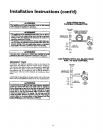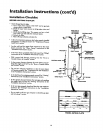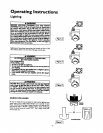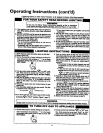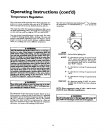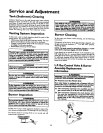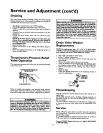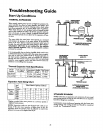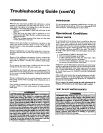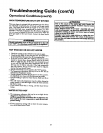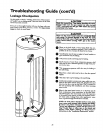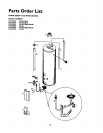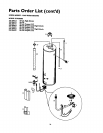
Troubleshooting Guide (cont'd)
CONDENSATION
Whenever the water heater is filled with cold water, a certain
amount of condensation will form while the burner is on. A
water heater may appear to be leakingwhen in fact the water is
condensation. This usually happens when:
• When a new water heater is filled with cold water for the
first time.
• When gas burns and water vapor is produced in water
heaters, particularly high efficiency models where flue tem-
peratures are lower.
• When you use large amounts of hot water in a short time
and the refill water is very cold.
Moisture from the products of combustion condense on the
cooler tank surfaces and form drops of water which mayfall
onto the burner or otherhot surfaces to produce a sizzling or
"frying" noise.
Excessive condensation can cause pilo t outage due to water run-
ning down the flue tube onto the main burner and putting out
the pilot.
Because of the suddenness and amount of water, condensation
water may be diagnosedas a "tank leak".After the water in the
tank warmsup (about 1-2 hours), the condition should disap-
pear.
Do not assume the water heater is leaking until there has been
enough time for the water in the tank to warm up.
An undersized water heater will cause more condensation. The
water heater must be sizedproperly to meet the family's demands
for hot water including dishwashers, washing machines and
shower heads.
Excessive condensation may be noticed during the winter and
early spring months when incoming water temperatures are at
their lowest.
Good venting is essential for a gas fired water heater to operate
properly as well as to carry away products of combustion and
water v'd.por.
A WARNING
HOTTER WATER CAN SCALI_.Water heatersare intendedto
producehot water. Water heatedto a temperature whichwill
satisfyclotheswashing,dishwashing,andother sanitizingneeds
canscaldandpermanentlyinjureyou uponcontact.Somepeo-
pleare more likelyto be permanentlyinjuredbyhot water than
otherg Theseincludethe elderly,childrentthe infirm,or physical-
ly/mentallyhandicapped.If anyoneusinghotwater inyour home
fitsintooneofthesegroupsor ifthere isa localcedeor statelaw
requiringacertaintemperaturewater at the hot water tap,then
_a must'tak_sp_al_s. Ina_i_n tousingsheb_st
•0_sibintomperamresettingthatsa'ds_esyourhotwa_r needs,
t meanssuchasa mixingvalve,shouldbe usedat the hotwater
taps usedby thesepeopleor at tile water heater.Mixingvalves
are avm3ableat plumbingsupplyor hardwarestores.Followman-
ufacturers instructions for installation of the valves. Before
changing the factory setting on the thermostat, read the
"Temperature Regulation"sectioninthismanual,
SMOKE/ODOR
It is not uncommonto experience a smallamount of smoke and
odor during the initial start-up. This is due to burning off of oil
from metal parts, and will disappear in a short while.
Operational Conditions
SHELLY WATER
In each glassllned water heater there is inst£led at least one
anode rod (see parts section) for corrosion protection of the
tank. Certain water conditions will cause a reaction between this
rod and the water. The most common complaint associated with
the anode rod is one of a "rotten egg smell". This odor isderived
from hydrogen sulfide gas dissolved in the water. The smell is
the result of four factors which must all be present for the odor
to develop:
a. a concentration of sulfate in the supply water.
b. little or no dissolved oxygen in the water.
c. a sulfate reducing bacteria within the water heater. (This
harmless bacteria is non-toxic to humans.)
d. an excess of active hydrogen in the tank. This is caused by
the corrosion protective action of the anode.
Smelly water may be eliminated or reduced in some water heater
models by replacing the anode(s) with one of less active material,
and then chlorinating the water heater tank and all hot water
lines. Contact Sears Service for further information concerning
an Anode Replacement Kit #9001453 and this Chlorination
Treatment.
Ifthe smellywater persists afrerthe anodereplacement andchlo-
rinationtreatment, we can only'suggestthat continuous chlori-
nation and filtering conditioning equipment be considered to
eliminate the waterproblem.
Do not removethe anode leaving the tank unprotected. By
doing so, all warrantyon the water heatertank ls voided.
"AIR" IN HOT WATER FAUCETS
AWARNING
HYDROGEN GAS: Hydrogen gascan be produced in a hot
water systemthat hasnot been usedfor a longperiodof time
(generally two weeks or more). Hydrogen gasisextremely
flammable and explosive.To prevent the possibility of injury
under these conditions,we recommend the hot water faucet
be openedfor severalminutes at the kitchenrink before any
electricalapplianceswhichare connectedto thehot water sys-
tem are used(suchas a dishwasheror washingmachine). If
hydrogen gas is present, there will probably be an unusual
Isoundsimilar to air escapingthroughthe pipeas the hot water
faucet is opened.There must be no smokingor open flame
nearthe faucetat the time it isopen.
23



